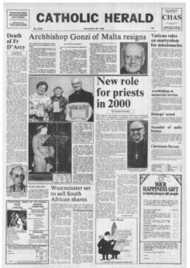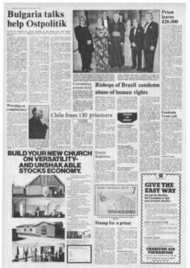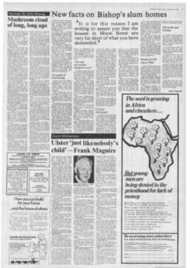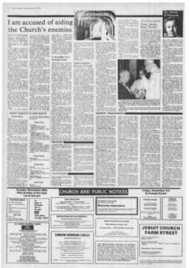Page 5, 26th November 1976
Page 5

Report an error
Noticed an error on this page?If you've noticed an error in this article please click here to report it.
Tags
Share
Related articles
May I Suggest That Serious Subjects Should Be Treated...
Papal Plea To Rebel Lefebvre Published In Unprecedented...
Rome Report On Lefebvre Splinter
Distorted Decrees
Pardon For Lefebvre Raised
Archbishop is misquoted
At the risk of appearing to presume on the hospitality of your correspondence columns, I would appreciate another op
lortunity of correcting a miseading report concerning Archbishop Lefebvre.
I refer to the article of November 19, headed "Why Lefebvre claims are wrong" by Fr Joseph Crehan, Si, I have a great admiration for Fr Crehan and have had occasion to be grateful to him for his help and advice on a number of occasions.
It was, therefore, with considerable surprise that I discovered that an article by him purporting to discuss Archbishop Lefebvre's attitude to the new Mass was devoted almost entirely to opinions expressed by those of whom the Archbishop has probably never heard and whose views he certainly does not share.
I can assure Fr Crehan that Archbishop Lefebvre has never alleged at any time that the new Mass is invalid or heretical. He has made this clear in his writings, his lectures, and confirmed it during an interview which he had the kindness to accord me during his recent visit.
Among other points which he was able to confirm during the interview were that he has not rejected the Second Vatican Council; that he has never claimed that the Bull aro Primal precluded any reform of the Mass by subsequent Popes; that he has never been connected with Action Frangaise; that there is no political dimension whatsoever to his current stand, which is based solely on theological considerations.
As regards the quotation cited by Fr Crehan — "It is no longer the priest who offers the Holy Sacrifice of the Mass; it is the assembly" — it would be helpful to see this set its context.
It is, of course, the teaching of Pope Plus XII that, after the Consecration, the entire congregationjoins with the priest in offering the Divine Victim and themselves. I would suspect that what Archbishop Lefebvre criticised was the growing trend in France to make the assembled congregation, rather than the making present of Christ's sacrifice, the raison d'ert of the Mass.
I could provide ample documentation to prove that this is happening (and not only in France). Theoretically this is contrary to the letter of the present liturgical legislation but Archbishop Lefebvre would argue — and I would support him — that it is a tendency which sprang inevitably from the official reform. It was a trend which Pope Pius XII had foreseen and condemned in Mediator Del.
Finally, while on the subject of inaccurate criticisms of Archbishop Lefebvre, 1 must state that I was saddened to discover that the pamphlet entitled "Light on Archbishop Lefebvre", published by the Catholic Truth Society, is replete with serious errors of fact. I have exposed a good number of these in a review of the pamphlet which will appear in the January issue of Christian Order.
It is strange that the critics of Archbishop Lefebvre do not realise, if only on the grounds of expediency, that putting forward allegations which they cannot substantiate will only increase his support.
The challenge which he and his supporters present to what Archbishop Benelli has described as the "Conciliar Church" is one which is not going to vanish no matter how devoutly those in authority hope that it will, The traditionalist movement in Britain has hardly got off the ground yet: when the newly ordained priests begin to return here from Econe there can be no doubt that it will expand dramatically. Archbishop Lefebvre's case will have to be answered one day. Why not sooner tether than ater?
M. T. Davies London, SE6.
I find the recent proposals to allow non-Catholic Christians to receive Holy Communion unconditionally in our church, totally unacceptable.
I am a convert of ten years. Like many converts there were great sacrifices to make in becoming a .Catholic, To accept the teachings of Christ's Universal Church without question after an easy-going Anglican upbringing was difficult, but my new-found love for Christ's Real Presence in the Blessed Sacrament saw me through.
The conditions laid down by the Church, to be fulfilled before receiving Our Lord in Communion are grave indeed. To receive Our Lord while in a state of mortal sin would be unthinkable and a spiritual suicide. A non-Catholic divorcee, living with a married man, and with two abortions behind her, could be quite at peace within her Church, and receive Anglican communion without conscience, She may also believe the Anglican teaching that Christ is not truly present in the Eucharist, and that the Mass is blasphemous. How could such a person be allowed to receive Our Lord in Holy Communion at Mass unconditionally, alongside a Catholic, when such grave conditions and penalties are imposed on Catholics when receiving the Sacraments?
Even the question of sincere Anglicans receiving Catholic Communion is doubtful. Do they really believe that Christ is not truly present in their Anglican communion, but is really and truly present at the Sacrifice of the Mass?
If they do, they have already taken the first step toward conversion. More prayer towards this end might he more fruitful than this piece of ecumenical humbug. K. Bailey Whissendine, Leicestershire.
I have read Fr Joseph Crehan's contribution on "Why Lefebvre claims arc wrong" (November l9) with much interest, and would like to concentrate on a facet of it where the writer seems somewhat glib. This is relevant to the legal language of Papal letters. When Innocent IV admonished Grossetest, Bishop of Lincoln to "provide" a canonry for his nephew the terms of his letter were legally watertight, but Grossetest refused on the ground that, although the request was legal, it was not licit, because the candidate was unworthy. Innocent had no answer, Abortion, for example, is "legal" in England and elsewhere, but as we all know it cannot be licit. The terms of Quo Primum are manifestly specific principally from a doctrinal angle, which is to safeguard an esseixtial rite relative to the faithful who come under Pontifical jurisdiction.
This is the moot point. Apart from that, Pius V surely knew what. he meant when he employed words like, "all", "perpetuity" and a phrase as, "It is licit, and without any attaching penalty, for clergy to say this Mass without constraint or scruple of conscience," If Pius knew, as Fr Crehan implies, that any possible papal successor could contradict such definite terminology, why go to the trouble of putting it on record? Manifestly, Pius could not envisage such an eventuality, as it would make the Magisteriant look like a jigsaw puzzle. We appear to be on the verge of a similar situation where Apostolicae Came of Leo XIII is in danger of being thrown overboard. May I draw attention to the papal Office as expounded in, The Catholic Encyclopaedic Dictionary" (Imprimatur of Westminster, 1930)? After cataloguing the Pope's sumpreme jurisdictional powers, the entry states: "But he (the Pope) cannot alter the Faith once delivered to the saints, or suppress, or modify any essential rites, or dispense from the Divine Law." (My italics.) Moreover, as the plena'', potntatis applies equally to Uniate Catholics of the East, and if the ageold Latin Mass is so outrageously old-fashioned for the needs of the twentieth century, would not this equally apply to the similarly venerable rites of St Basil and St John Chrysostum? Shall we be seeing a Novas Ordo Ritartn Oriontails? Or, would that be really too dangerous? James Goldsbury Nottingham.
blog comments powered by Disqus









